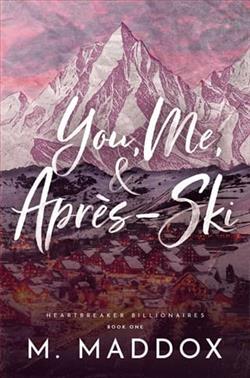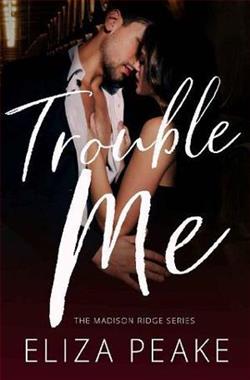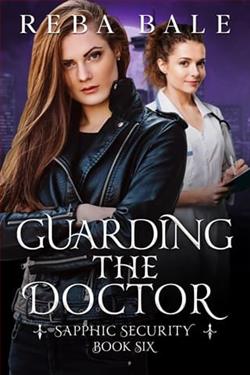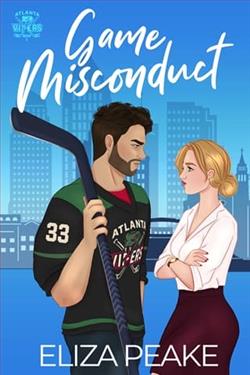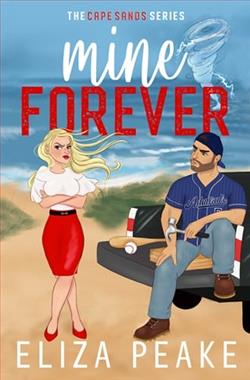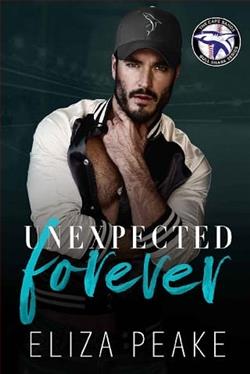Page 52 of Destined for the Cowboy
For a moment his resolve wavered. How did you battle someone who no longer existed? A ghost? Especially knowing he’d been a man who could give his wife everything any woman could want. Not just wealth—he knew Tris wasn’t impressed with that from the stories Jackson had told of how she kept his success from going to his head—but brains, class, and the respect of an entire community.
He managed—barely—not to stare at the photograph on the far wall that had been one of the first things he’d noticed. Tris looked much the same now, although with that shadow that darkened her eyes now and then. Carhart had been older but looked enraptured in the picture. Who wouldn’t be, about to have that woman as his wife?
He quickly shifted his focus to the other large picture, the one of Jackson and Jeremy, and his late wife. A lot of tragedy in a single family. Was that worse than having had no family at all?
His ricocheting thoughts next hit the image hanging in his workshop, of him and Bud. He’d always thought because he hadn’t had a family like other people he’d escaped the kind of grief Tris had felt, twice in her life. But now, standing here, he caught himself wondering if—
“What? What is it you’re thinking right now?”
Her voice was gentle, but urgent. When he looked at her, when he looked into those eyes, he couldn’t not answer. “I…was back on Tennyson.”
“Would you really rather see a bare wall? Because there was nobody you ever loved to remember? Not even Bud?”
How did she do that? How did she know where his mind had gone? Was he that obvious, or was she just a mind reader?
“No. No. It was worth the pain of losing him to have had him in my life.”
“Especially since he was the only one who ever really gave a damn about you? In the way family does?” She grimaced. “Sorry. Or should,” she amended.
“You don’t have to apologize. It doesn’t matter that much anymore. It stays where it belongs, buried, most of the time.”
She reached out and laid a hand on his forearm. She did it gently, almost caressingly, yet it sent a jolt of sensation through him that nearly left him breathless.
“I’m glad.”
He took another swallow of coffee, not knowing what to do or say to that. He glanced around again, unable to deny he was curious about this place she lived, yet didn’t seem to like all that much. Another screech and a loud adult response from next door made him look back at her. She shrugged and gave an eye-roll, as if to say “See what I mean?”
The coffee maker hissed, and she went over to turn it off. He found himself watching her every move, because he couldn’t seem to help himself. When she turned to come back, he immediately turned his head, to avoid being caught staring at her. Again.
But when he did he saw the photograph on the counter beside the coffee maker, propped against the wall. He recognized the location immediately, and started to smile at theimage of the tiny horse trying to navigate a leap that seemed too much for it.
The expression froze on his face when he realized that was him in the image, crouched beside the little bronze creature, his hand resting on the withers. He remembered the moment, when he’d felt that urge to reach out and reassure the foal, even in this inanimate form. He’d felt a little silly, but wrote it off to the consummate skill of the brilliant artist. He’d never realized she’d been watching him. Certainly never realized she’d taken a photo.
And even if he had, he would never have expected her to have it here, in plain sight, where she would see it…every day.
His gaze shot back to her. She’d clearly seen where he was looking. He thought he saw a slight tinge of color in her cheeks, but maybe he was imagining it.
“I had such a good time that day,” she said, her voice soft and holding an undertone he couldn’t name but that sent a ripple of heat through him.
“So did I.” He barely got out the words. All he could think was if she had a good time that day, then maybe he wasn’t as crazy as he’d thought to show up to ask her what he had in mind.
She tilted her head in that way she had that seemed both curious and assessing. She hesitated for a moment, then said, “What was it you wanted to talk about?”
He hesitated, then went for it. “Remember that book we picked up at the museum at Fort Sam Houston?” He waited, more tensely than the question ordinarily would deserve.
“The one about the Revolution?” He nodded. “I do remember. It was fascinating, with some angles I’d never thought of before. And he mentioned Last Stand, so I was sold,” she said, with a wide smile.
He took a breath, and then let loose the words he’d actually practiced before coming here. “The author’s going to be speaking at the bookstore in town this Saturday afternoon. I thought…wondered if…maybe you’d like to go.” The rest, the truly important part, came out in a rush. “And we could have dinner after.”
For a too-long moment she just stared at him. He was about to give up hope when a slow, sweet smile curved her mouth—that mouth—and she almost seemed to light up. “I would like that. Very much. Especially the dinner part.”
He felt a rush of relief. And sent a silent thank you to her brother for giving him the nerve to even try.
Now he had nearly two days to steel himself. Not just to tidy himself up as he had today to ask her, but to work himself up to where he could be at least coherent on Saturday, maybe even interesting. Both of those he could and had managed.
He just hadn’t done it sitting across a table from Tris Carhart.
As it turned out it wasn’t a matter of steeling himself, it was a matter of stopping himself from backing out of the whole thing. On Saturday morning he found himself backtracking in time, remembering that day he’d encountered her shortly before her husband’s death. He’d never formally met her then, but everyone in Last Stand knew who she was. And the pain in those eyes of hers had been so deep, so harrowing, it sliced through his shields. So he had said the only thing he could think of. And it had meant something to her. Enough that she remembered it even now, all this time later.








